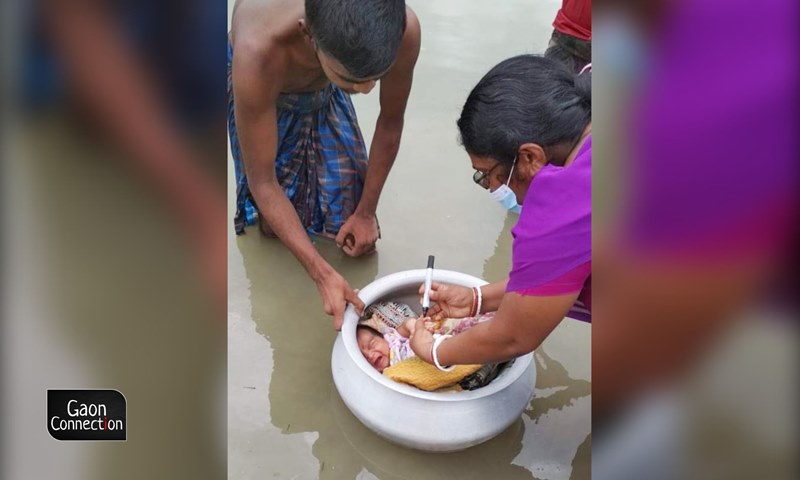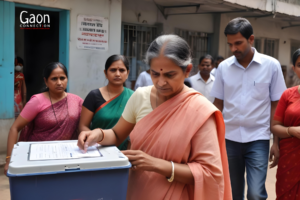Baruipur (South 24 Parganas), West Bengal
Rafikun Neesha, an ASHA worker, held aloft a banner along with her colleagues in front of the Chief Medical Officer’s office at Baruipur block in South 24 Parganas. The 45-year-old, along with the other frontline health workers, had assembled there to protest against non-payment of incentives they were promised for over five months from June to October this year.
Rafikun is one of the 60,000 registered ASHA (Accredited Social Health Activist) workers in West Bengal, whose contribution to rural healthcare has been invaluable, especially in the COVID19 pandemic. India has about one million ASHAs who form the backbone of our rural healthcare system.
In the past one year, there have been sporadic protests in several parts of the country as ASHA workers demanded a hike in their honorarium and the status of a government employee.
In West Bengal too, last month on October 29, across the 19 districts in the state, ASHA workers protested outside the offices of the Chief Medical Officers of Health, who come under the department of Health and Family Welfare, Government of West Bengal. Rafikun, who was part of the protest, has been an ASHA worker for nearly 12 years at the sub center of the Balban Primary Health Sub Centre, South 24 Parganas.
“ASHA workers are paid an honorarium of a mere Rs 4,500 a month. While they are promised incentives for a lot of the work they put in, the incentives rarely get paid to them on time,” Ismat Ara Khatun, general secretary of the West Bengal Union of ASHA workers, told Gaon Connection.
As it stands now, ASHAs are not permanent employees of the government. These health workers are paid a pittance for the work they do and receive very few or no benefits at all, such as pension, medical leave, holiday pay, medical insurance for COVID19, etc, complained the protesting ASHAs. “And, as their payments are mostly incentive-based, their monthly income is irregular and fluctuates month to month,” the general secretary Khatun explained.
“With the added COVID19 duties they had to undertake, the state government promised the ASHAs an extra thousand rupees a month, which are yet to be paid,” Ismat Ara said. The ASHAs who were part of the election duty from March 27 to April 29, 2021 that was held in eight phases during the pandemic, are still waiting for the Rs 670 they were promised for it, she added.
Overworked and underpaid
At the onset of pandemic in March 2020, the Union Health Ministry tasked ASHAs across the country to survey the people in their communities/villages to identify COVID19 cases. They had to track coronavirus positive cases, arrange for the testing kits and if anyone was found positive, ASHAs had to ensure they were properly quarantined at home or escorted to the nearest COVID hospital.
Apart from this, these women health workers also raised community awareness about the pandemic, collected data and worked tirelessly, against overwhelming odds.
When the state government recruited the ASHA workers in 2010, it loosely described their work as including pre and post natal care of women in their area of work, taking the women to the local hospital for a safe delivery, besides maintaining health records and raising community health awareness.
When they could not organise community awareness programmes during the pandemic, because of lockdown and pandemic restrictions, huge deductions were made in their pay, Ismat Ara alleged.
Also Read: “I have to wait for nine months to be paid Rs 600 incentive for one delivery”
Pampa Naskar works at Dhapa, which comes under the Kolkata Municipal Corporation. The 38-year-old ASHA worker said that the incentives they received for the kind of work they were expected to do were dismal.
“We were given two hundred rupees to be shared amongst three of us, for the vaccination we administered. Usually even that is not paid on time,” she told Gaon Connection.
Rs 75 a day for polio drive
These frontline workers are part of every vaccine drive in the state from administering polio vaccines to babies to the COVID19 vaccination. They are involved in schemes such as Swachh Bharat Abhiyan and Nirmal Banglantoo. Yet they are paid a pittance, Ismat Ara said.
Recently a photograph of an ASHA worker administering a polio vaccine at Canning, a town in South 24 Parganas, went viral on social media. “She was giving the polio vaccine to a baby that was in a cooking vessel in flooded Canning. We were paid Rs 75 a day for that door-to-door polio campaign,” Ismat Ara said.
“Sometimes we are asked to look for families not having toilets in their homes! Is this our work?” Firoza Begum, who worked under the Madarat PHC in South 24 Parganas, asked Gaon Connection. “And after all this, we are treated like nobody,” the 48-year-old ASHA worker complained.
The protesting ASHA workers said it was common that they went for hours without food or even toilet facilities when they were on duty. And still they were not respected. Mita Das from Joynagar, Block-1, added angrily that the nurses at the hospitals treated them very badly.
Woes of urban health workers
In the urban centres there are the Honorary Health Workers (HHW) who after training are elevated to the post of ASHA. Their woes are no different from their rural sisters. They too are entrusted with administering vaccinations, etc, but they too are an underpaid and underappreciated work force.
“Living expenses have gone up, and I am finding it difficult to make ends meet,” Pratima Haldar, a retired honorary health worker from Kolkata Municipal Corporation, told Gaon Connection. Pratima was the sole earring member of her family, and she said she had received no monetary benefit when she retired.
Also Read: ASHAs brave the second wave of COVID19. Without masks, sanitisers and rightful remuneration
It is the same with 60-year-old Laxmi Sardar, another retired honorary health worker, who complained that after her retirement she was left with little money to run her household.
When Chandrima Bhattacharya, the deputy minister of state, health and family welfare, West Bengal, was asked about the situation, she said she had no knowledge of the representation of the protesting ASHA workers. However, she was full of praise for the work they did during the pandemic.
“The chief minister and the principal secretary are very impressed with the work of the ASHA workforce during the COVID19 pandemic,” Ajay Chakraborty, a health officer, Swasthya Bhawan, Kolkata, told Gaon Connection. He made an assurance that the government would look after the demands of the ASHA workers.
Meanwhile, Subrata Roy Chowdhury, chief medical officer at the Kolkata Municipal Corporation said that in Kolkata most of the ASHA workers had received their dues. “In case there are some pending payments, they will be getting them soon,” he told Gaon Connection.















